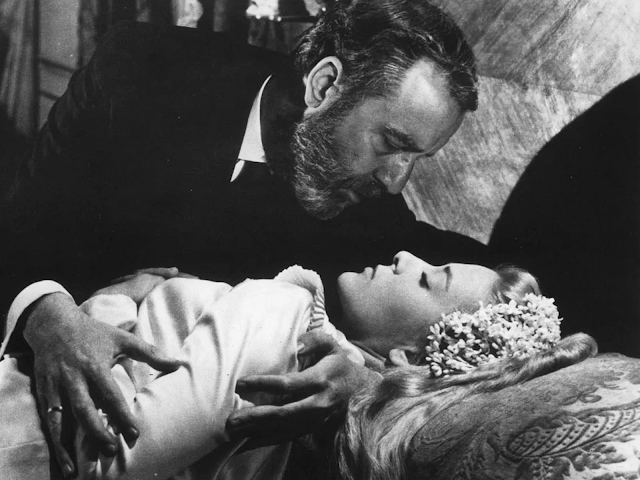Viridiana (1961)
Luis Bunuel's "Viridinia"
After establishing himself as a mainstay director in Mexico in the 1950s, Luis Bunuel packed up and headed back to his homeland Spain. But why, when famed dictator Francisco Franco still held power. Nobody knows the reason, but it becomes clear after watching Bunuel's 1961 film "Viridiana" that Bunuel certainly meant to provoke. Bunuel had come to be known for making audacious films. "L'Age d'Or" and "Los Olvidados" are two such examples that caused a ruckus in their respective time. However, it is "Viridiana" that takes the cake for his most audacious film to date.
"Viridiana" tells the story of a woman named Viridiana who, before taking her vows as a nun, is told to visit her wealthy benefactor uncle. When she visits him, he is so struck by her resemblance to his wife, that he drugs and rapes her. After she attempts to flee back to the convent, he hangs himself. Feeling guilty, she decides not to take her vows and live a life of charity. By doing so, she welcomes beggars and vagrants into one of the outbuildings of her uncle's estate. His son, Jorge, arrives and begins to take notice of his cousin. After an extended time away, the vagrants decide to break into the mansion, where they pocket things, hold a banquet, and descend into a drunken orgy of sex and destruction. When Viridiana and Jorge return, some of the beggars rape Viridiana at knife-point, before Jorge intervenes and kills the rapist. The film ends with Viridiana entering Jorge's room where she finds him and the maid, as she sits down and begins playing cards with them; 'modern' rock and roll music playing on the radio.
Being known as a surrealist, Bunuel always injected a sense of surrealism in all his pictures. That degree of surrealism tends to vary. In his earlier works like "Un Chien Andalou" and "L'Age d'Or," that surrealism is turned up to 11. However, in his Spanish-language films, he tends to dial it back in favor of sparing surrealism taking place amongst a realist environment. "Viridiana" is no different. Surrealism happens in the smallest of moments. Eventually, those moments stack up into a crescendo of absurdity. Bunuel wants us to be aware of the reality of his film while also making the connection to the folly of the human self. Characters and situations in "Viridiana" are endlessly complex and paradoxical. A nun is a whore, a crucifix is a weapon, deplorables are holy, a spoiled rich man is also an empathetic person, etc. Nothing in "Viridiana" presents an absolution of the world.
In his past films, Bunuel would condemn Catholicism and the bourgeoise blatantly. Here, he doesn't seem to outright condemn them, but rather present them in the same vein as he presents everything else - as paradoxical. Actually, I take that back. There are explicit images of this like a crown of thorns being thrown into a fire and beggars' banquet being made to look like the last supper. So, yes "Viridiana" also actively critiques these notions.
It might be too early in my Bunuel filmography to call this, but I see "Viridiana" as being Bunuel's bleakest yet. Perhaps I am forgetting about how incredibly bleak "Los Olvidados" is, but "Viridiana" is right up there. Bosley Crowther of "The New York Times" commented on the film's release that the theme of the film was "that well-intended charity can often be badly misplaced by innocent, pious people." However, I don't think the theme is that simple. Viridiana's failed attempts at trying to be charitable don't seem to me to be a larger contingency of the film. I don't think Bunuel is making any sort of political or social statement about specific things. Rather, I believe he has constructed a world in which nothing makes sense and everything is on the table. Like in most of his filmography, his characters always seem to digress down to their natural base instincts. Usually, this instinct is animalistic, selfish, and amoral. Even our acts of charity seem rather moot. In one scene, Jorge sees a man abusing a dog by tying it to his horse and wagon and having it keep up. After buying the dog to save it from exhaustion, Bunuel shows us another dog tied to another wagon pass by. Bunuel seems to suggest that it is all futile. No amount of good intention can make up for the senseless and debasing nature of humanity and our world at large. Because of this, the world of "Viridiana" caves in on itself. Humanity is going to shit and always will. Even the vagrants and beggars that are given food and housing will completely take advantage and sprawl into chaos. Even Viridiana herself must give in to this imminent amorality by the end. When she about to engage in a 'ménage a trois' with her cousin and his maid, Jorge points out the 'modern' music that is being played. To the contemporary ears, it is simply rock and roll. However, at the time, many considered the rowdy nature of rock and roll to be a sign of degrading morality and a celebration of anti-formalist notions. When the final 'fin' arrives, rowdy music plays, a nun is about to completely reverse her morality, a home for beggars degraded into a drunken orgy, nobody was saved, and everything and everyone has completely debased themselves for no reason other than it's just who we are as a species. The theme of "Viridiana" is just as dark, complex, and paradoxical as its characters and it could not be a more audacious picture.




Comments
Post a Comment